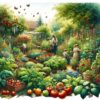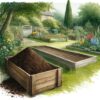How to use leaves as mulch and fertilizer
I love the fall, and there is nothing quite as pretty as the changing landscape and fallen leaves on green grass. As autumn showcases a vibrant palette of red, orange, and yellow, us gardeners are often left wondering how best to utilize the carpet of fallen leaves that grace our yards. The answer lies in composting leaves! In this guide, we’ll delve into the mesmerizing world of composting, understand its biology, explore methods like bins or piles, walk through a checklist, and finally learn the optimal time and techniques to apply composted leaves to your garden.
The Magical Transition of Fall and the Treasure Beneath Our Feet
Every leaf that drifts to the ground in fall carries with it a trove of minerals drawn from the soil. These leaves are not just remnants of a season gone by; they are nutrient powerhouses that can be recycled for garden growth next season. When composted, these leaves return their rich mineral content back to the earth, ensuring that the cycle of growth continues.
Unraveling the Biology of Composting
Composting is a marvel of nature where organic materials, in our case leaves, undergo decomposition to become a nutrient-rich, soil-like material. This metamorphosis is orchestrated by a thriving community of microorganisms such as bacteria and fungi, along with larger creatures like worms and beetles.
These organisms feast on the leaves, breaking them down while producing heat as a by-product. This explains why the heart of a compost pile is warm. The culmination of this microbial symphony is the creation of compost: a dark, crumbly, and wonderfully earthy-smelling material.
A Matter of Time
The decomposition of leaves through composting isn’t instantaneous. While factors like temperature, moisture, and the presence of certain microorganisms can influence the speed, typically leaves can take anywhere between 6 to 12 months to fully break down into compost in a home setting. Thhis is perfect timing from fall to spring!
Deciding Between a Bin or a Pile
Choosing a method for composting largely depends on individual preferences and the space available.
- Using a Bin
- Pros: Bins keep the process neat and are effective in keeping pests at bay. Due to their enclosed nature, they can retain heat better, expediting the composting process.
- Cons: They need occasional monitoring to ensure there’s enough air circulation, vital for decomposition.
- Opting for a Pile
- Pros: It’s a straightforward method. Simply gather your leaves and let nature take the wheel.
- Cons: Decomposition might be slower, and piles can occasionally become critter attractions.
Remember, both methods are effective, and the choice boils down to what suits your situation best.
Your Ultimate Composting Checklist
- Gather Those Leaves: Arm yourself with a rake or leaf blower.
- Size Matters – Shred Them: Using a mower or shredder to shred the leaves can hasten decomposition as the smaller bits break down more quickly.
- Keep It Damp: Aim for a moisture level similar to a squeezed sponge.
- Stir It Up: Rotate the contents every few weeks to aerate.
- Wait It Out: Your patience will be rewarded with rich compost in 6 to 12 months.
- The Final Product: Look for dark, crumbly compost with an earthy scent.
Timing is Everything – When to Use Your Leaf Gold
When your leaf compost resembles dark brown, fragrant soil, it’s ready. Spring emerges as the prime time to enrich your garden with this compost, prepping it for the planting revelry ahead.
Master the Application for a Thriving Garden
- Dress It Up: Lay a 2-3 inch layer atop your garden beds.
- Mulch Magic: Surround your plants with compost to keep moisture in and weeds out.
- Gift Your Lawn: A thin layer over your lawn can do wonders.
- Potting Partner: Blend with potting soil for a nutritious mix for potted plants.
In essence, composting leaves is nature’s recycling program. It reduces waste, nourishes the earth, and propels the cycle of growth. This fall, gift your garden the magic of composted leaves and witness nature’s gratitude in blooms and bounty.
Recent Posts

Coffee Grounds for Plants: Unveiling the Myths and Truths

The 7 Most Popular Succulents to Grow in Your Garden

Cultivating a Healthier You, One Seed at a Time

5 Great Gifts for the Urban Gardener: Enhance Your Green Space with These Must-Have Tools

Understanding “How Much is a Yard of Dirt?” A Comprehensive Guide for Gardeners










